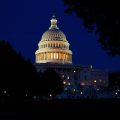
Last week the federal Department of Health and Human Services proposed a new rule that lets adoption and foster care agencies operate according to their religious beliefs.
The proposal helps roll back Obama-era attempts to force Christian adoption and foster care agencies to place children with same-sex couples despite the agencies’ deeply-held religious convictions regarding marriage and family.
Our friends at Focus on the Family’s Daily Citizen writes,
While these developments are extremely positive, the impact may be a bit limited. Lori Windham of the Becket Law Firm, explains:
“HHS just proposed a regulation that will allow faith-based adoption and foster care providers to serve their communities consistent with their religious beliefs. That’s a smart thing to do, but it would only fix part of the problem. … Unfortunately, state and local governments use similar rules to try and shut down faith-based agencies. Faith-based agencies therefore still need help from SCOTUS.”
State rules have already forced some Christian adoption agencies to choose between obeying their faith and obeying the government.
In Michigan, for example, St. Vincent Catholic Charities and Bethany Christian Services both have found themselves at odds with government policies over the placement of adoptive and foster children.
At World magazine, Jamie Dean writes,
“[E]arlier this year, the Christian groups faced a government ultimatum: accept applications from same-sex couples for foster care and foster care adoption or lose the legal right to conduct foster care in Michigan. The Catholic group refused. Bethany complied. “
Since then, Dean writes, St. Vincent has challenged the government policies and won a preliminary injunction in their favor in September.
A similar case is playing in Philadelphia where city officials have targeted faith-based adoption and foster care agencies.
In February Arkansas state Senator Alan Clark (R – Lonsdale) filed S.B. 352. The bill was intended to protect faith-based adoption and foster care services in Arkansas, but it ultimately was referred for study and discussion during the interim between now and 2021.
All of this underscores that while a federal rule change is good, religious liberty must be protected at the state level as well.
You can read more about the federal government’s proposed rule change here.




